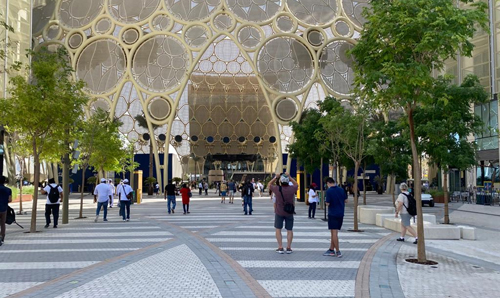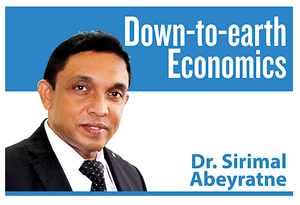“World in one place”
View(s):
World gathers in Dubai for Expo 2020. Picture by Dr. Faheema Saheed
Faheema Saheed has been one of my students since her undergraduate time. After completing undergraduate studies, she started postgraduate studies too, completed her Master’s degree as well as the PhD degree and, became a visiting lecturer at the University of Colombo. A couple of weeks ago I met her after she had returned from Dubai. International travels, particularly to East Asian and West Asian destinations are not new to them, because they often visit these places for business purposes. But they had to put all their business travels on hold for a long period because of the outbreak of the COVID-19 pandemic.
A bombshell
In our conversation, she explained about the two weeks that she and her husband spent there as well as about the Expo 2020 event taking place there in Dubai. As she told me, she and her family were inspired by all the “positive comments” about travelling to Dubai so that they chose Dubai for their travelling after the post-COVID lockdown. They had heard about the high level of safety standards in Dubai in compliance with effective global health protocols.
She gave an example: “After we landed in Dubai, we had to do a PCR test in addition to what we had done here before the departure. But we didn’t have to stand in queues in the airport and to wait for hours to get the reports. Everything was digitalised, very well organised, very quick and very easy; just within two hours, we got the PCR test report through SMS to our mobile phones.”
Then she dropped a bombshell: “Sir, my husband is thinking of shifting our businesses to Dubai; it’s very easy to operate businesses from there, so we might be leaving the country.” They were involved primarily in the rubber manufacturing and exporting business as well as in the leisure industry. If such businesses move away from Sri Lanka, then it affects incomes, jobs and foreign exchange earnings and, all these things would eventually contribute to the economic downturn of the country – slow growth, unemployment and, foreign exchange shortage, directly and indirectly!
Some years ago, in the same way some of the companies producing “Ceylon Tea” brands shifted their tea processing and packaging businesses to Dubai. Tea and rubber both are Sri Lanka’s two major export crops, but some of the manufacturers involved in both industries find it easier to do businesses in Dubai than in Sri Lanka.
It may be true that Dubai city or the United Arab Emirates (UAE), cannot produce either tea or rubber in the deserts so Sri Lanka can continue to remain a country supplying tea and rubber as a raw material, as long as it can supply them at competitive prices. In fact, there are other countries which supply them too. It means that the manufacture of tea and rubber products and their world market exports would be done in a different country, even if such crops cannot be grown there.
Everyone wants to go
“The person you are trying to call is currently overseas…!” It was a message I heard over the phone, when I tried calling a journalist-friend a few weeks ago. Then I sent him a text message through which I came to know that he was also in Dubai.
 He sent me a reply message: “I am in Dubai. And now in the evening, I am getting ready to go and watch the cricket match.” Of course, I remember, the ICC World T20 cricket matches were being played there.
He sent me a reply message: “I am in Dubai. And now in the evening, I am getting ready to go and watch the cricket match.” Of course, I remember, the ICC World T20 cricket matches were being played there.
In my reply, I included a question for him: “About 15 million people visit Dubai every year. Can you find out before leaving there why on earth people in such big numbers want to go there? I hope they don’t come to see a desert!”
On the same day night, we had scheduled an important online meeting on the zoom platform. Dr. Dayaratne de Silva had to attend the meeting too, but he was missing there. While we carried out the meeting halfway through, he turned up with a big apology: “I completely forgot our meeting today, because I was engrossed with the television watching the cricket match in Dubai.”
Then he drew a parallel for the subject matter of the meeting as well: “You know the Emirates never played cricket. Dubai is not a place for outdoor games like cricket because of the hot day-time climate and sandy desert. Although it looks like an impossibility, now the world gathers there to play international cricket.”
“You can see that it’s a good example for creating a “conducive environment” for international cricket because we are also here talking about a “conducive environment” for business!”
Unmatched product
As I remembered the question that I sent to my journalist-friend who should have also been in that cricket stadium at that moment, I checked the phone to see and there was his reply: “People come here because Dubai has created a ‘product’ that is unmatched in the world!”
The product that he referred to is not a particular commodity or a service; it is about ‘everything’ there that somebody has to deal with, which is unmatched in the world and which is being improved constantly to retain that position.
In fact, it is not even the locals who created that product, but the immigrant foreign workforce. Dubai is being built by expatriate workers from other countries, both rich countries and poor countries. The UAE has, perhaps, the highest migrant share of the population among the countries in the world. It has nine million people, out of which about 90 percent are foreign-born. They are residents working on temporary job contracts, while they would not be integrated as UAE citizens so that most of them are there to do business, work and leave.
In this dynamic and diversified country, the residents enjoy cultural, religious and economic freedom and security. Within the diverse multicultural society people coexist peacefully which helps the UAE economy to move forward without conflicts. Safety and peace are maintained within the boundary of strict laws and regulations.
Dubai has also created a conducive environment for investors who create businesses and attract people to do business from all over the world. It has also become a popular tourist destination with its high-income city which has less oil reserves than its counterparts. Today, it’s an extravagant tourist destination with the world’s tallest building, largest shopping malls, attractive theme parks, luxurious hotels and skyscrapers in a state-of-the-art infrastructure and transportation system – all of which are only man-made tourist attractions.
Conducive environment
What is the ‘conducive environment’ for business? Let’s understand the basics of a conducive environment for business.
The first and foremost factor is how easy it is to do business. If you have to meet the politicians, sit with bureaucrats, visit many offices, collect many documents, collect many signatures and so on, it is not easy to business. In such systems, digitalisation is backward, and corruption is forward, adding more fuel to the problem.
Then you look at the inputs you need for your business. You need professionals and workers, land and buildings, technology, infrastructure and logistics, services and utilities, and material inputs. With respect to all these things, there should be guaranteed availability, affordability and world-class quality. Even if there is a single item missing there, you can’t do business!
Thirdly, if anything is not in the local market, it should be available from other countries. This means that there should be cross-border policies and regulations facilitating your business through trade and investment. Finally, you should be certain about policy direction, policy predictability and policy consistency. In addition, you are concerned about peace and safety of your business as well as your residency.
Many countries in Asia, however, struggle to create that conducive environment for business. The irony is that at a time that almost all countries are trying to build that conducive business environment, investors have a better choice. And the locations with better conducive environments gain more, while others can even lose what they have already built.
(The writer is a Professor of Economics at the University of Colombo and can be reached at sirimal@econ.cmb.ac.lk and follow on Twitter @SirimalAshoka).
Hitad.lk has you covered with quality used or brand new cars for sale that are budget friendly yet reliable! Now is the time to sell your old ride for something more attractive to today's modern automotive market demands. Browse through our selection of affordable options now on Hitad.lk before deciding on what will work best for you!


